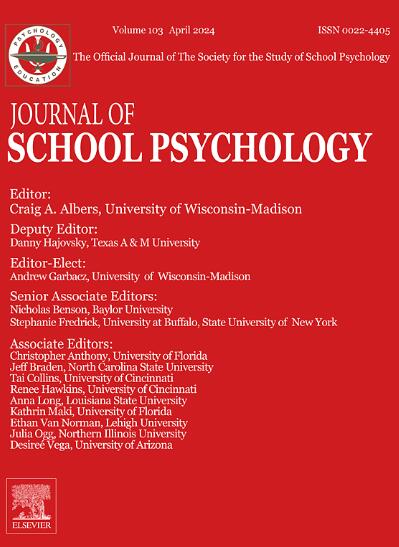A pilot study of a game-supported organization and planning skills intervention for young adolescents with ADHD
IF 4.1
1区 心理学
Q1 PSYCHOLOGY, SOCIAL
引用次数: 0
Abstract
Several school-based interventions for attention-deficit/hyperactivity disorder (ADHD) are well-established, but there are clear implementation challenges in those settings. Computer-assisted options have emerged that could augment treatments in schools in a way that is acceptable to students and teachers. In the present study, we piloted a novel computer-assisted behavior intervention (CABI) using a serious game designed to teach the organization, assignment tracking, and notetaking skills taught within the Challenging Horizons Program - Mentoring Model (CHP-M). Thirty-one middle school students with ADHD and their teachers were randomly assigned to either receive the CABI or the traditional CHP-M, with all teachers providing supportive mentoring for up to 24-weeks of intervention. Our data were analyzed using both Bayesian and frequentist modelling. Results suggest that the Time × Condition interactions were generally small (ηp2 = 0.00 to 0.11) and inconclusive. The CABI approach performed consistently with the traditional CHP-M, with credible and significant main effects of time on academically relevant behaviors (ηp2 = 0.09 to 0.59). Implications of our findings and the contributions of the Bayesian analytic approach are highlighted.
游戏支持的组织和计划技能干预青少年多动症的初步研究
针对注意缺陷/多动障碍(ADHD)的一些基于学校的干预措施已经建立,但在这些环境中存在明显的实施挑战。计算机辅助方案已经出现,可以以学生和教师都能接受的方式增加学校的治疗。在本研究中,我们试点了一种新的计算机辅助行为干预(CABI),使用一个严肃的游戏来教授挑战视野计划-指导模型(CHP-M)中教授的组织、任务跟踪和笔记技巧。31名患有多动症的中学生和他们的老师被随机分配接受CABI或传统的CHP-M,所有老师都提供长达24周的干预支持指导。我们的数据分析使用贝叶斯和频率建模。结果表明,时间与条件的相互作用一般较小(ηp2 = 0.00 ~ 0.11),不确定。CABI方法与传统的CHP-M方法表现一致,时间对学业相关行为的主效应可信且显著(ηp2 = 0.09 ~ 0.59)。我们的发现和贡献的贝叶斯分析方法的含义是突出。
本文章由计算机程序翻译,如有差异,请以英文原文为准。
求助全文
约1分钟内获得全文
求助全文
来源期刊

Journal of School Psychology
PSYCHOLOGY, EDUCATIONAL-
CiteScore
6.70
自引率
8.00%
发文量
71
期刊介绍:
The Journal of School Psychology publishes original empirical articles and critical reviews of the literature on research and practices relevant to psychological and behavioral processes in school settings. JSP presents research on intervention mechanisms and approaches; schooling effects on the development of social, cognitive, mental-health, and achievement-related outcomes; assessment; and consultation. Submissions from a variety of disciplines are encouraged. All manuscripts are read by the Editor and one or more editorial consultants with the intent of providing appropriate and constructive written reviews.
 求助内容:
求助内容: 应助结果提醒方式:
应助结果提醒方式:


